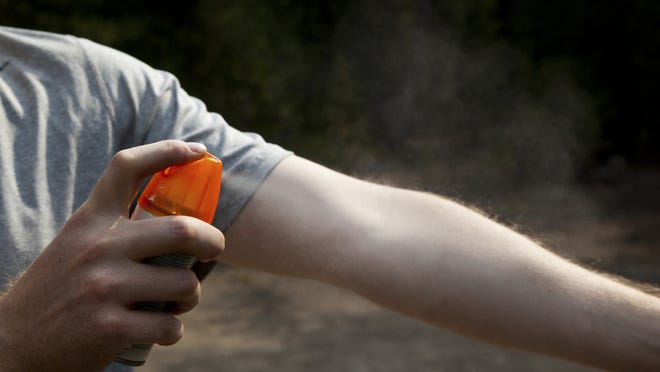NJ towns see an uptick in mosquitoes. Here’s what’s being done, how to protect yourself – Daily Record
Sick of flooding rains and spotted lanternflies? Add one more to the list as Mother Nature has unleashed another seasonal plague to ruin this year’s last warm days in North Jersey: the mosquito.
Blame it on one of the wettest summers in recorded history, which has extended into the fall.
Morris County Mosquito Control, for one, has received more than 1,000 complaints of mosquito infestation since the beginning of the month.
That’s about 10 times the usual number of mosquito calls at this time of year, said Kris McMorland, director of Morris County Mosquito Control.
“We should be winding down, but coming off the super-wet summer and two hurricanes in a row, it’s monumental,” McMorland said. “If you live near one of the river systems or tributaries where there was mass flooding, that’s where we are having problems with mosquitoes.”

Those bug-infested acres include portions of the Rockaway and Passaic river valleys in Long Hill, Lincoln Park, Montville and Denville. Towns bordering swampy Troy Meadows, including Parsippany and East Hanover, also are among the worst-hit towns, McMorland said.
Three months of rain fell in two weeks, he said: “Henri never dried down, and then Ida landed on top. Lincoln Park had 10 inches.”
Our soggy state has proved popular with the aggressive Asian tiger mosquitoes, which McMorland warns “are spreading throughout the county, yard by yard, favoring man-made structures and carrying disease.”
When do mosquitoes go away?
More rain means more puddles and more standing water, where mosquitoes can breed in as little as five days. That means more mosquitoes at least until the first frosts begin and the population begins to die off naturally.
West Nile virus, symptoms
More mosquitoes mean more diseases, including the West Nile virus, which peaks during August and September.
Fourteen human cases have been reported so far this season, including a Camden County man in his 60s who became infected in mid-July and died after the disease invaded his brain and nervous system, the state Health Department said.
Two cases were reported in Bergen County, one in Camden and one each in Essex, Gloucester, Middlesex, Passaic, Somerset, Ocean and Monmouth counties.
Tests have also found more mosquitoes carrying the virus than in a typical year, the Health Department said last week.
A mystery:What’s behind the unknown disease killing birds in New Jersey?
Added protection:Can Moderna or J&J vaccine recipients get a Pfizer booster shot or should they wait?
According to the Centers for Disease Control and Prevention, 80% of people infected with West Nile virus don’t experience symptoms. Those who do can experience symptoms ranging from headaches to body aches, vomiting and diarrhea, with fatigue and weakness that can last for months.
About 1 in 150 people infected with West Nile develop severe illness affecting the central nervous system, which can result in disorientation, convulsions, paralysis and comas.
West Nile virus has also been found in several species of floodwater mosquitoes, common in floodwaters such as meadowlands, woodland pools, flood plains and marshes. It has also been isolated in mosquito species that breed in discarded tires.

A single container can produce tens of thousands of mosquitoes over a season, according to the New Jersey Department of Environmental Protection.
“Depending on the species — and we have a few in New Jersey — some adult mosquitoes hibernate and some will overwinter in egg stage until they get wet and then hatch, up to five years later,” McMorland warned.
What’s being done
Morris County inspectors are investigating every reported site and have scheduled daily spraying, often using all-terrain vehicles to travel deep into wooded areas.
Large areas are treated at night.
“The staff is doing its best to keep up,” McMorland said.
Saturday, they were on Patriot’s Path in Morristown. Monday, spraying was scheduled in Denville, Chatham, Pequannock, Parsippany, Montville and Roxbury. Daily updates in the department website detail specific times and roads for the spraying.
Passaic County residents also can find a county spraying schedule online.
Other Morris staff is administering adulticide treatments via trucks and backpacks, and hand-spreading treatments for larval control.
Bergen County Mosquito Control inspects and treats non-residential areas by helicopter to control mosquitoes, including marshes and wetlands.
What you can do
Residents are urged to address standing-water areas where mosquitoes can quickly breed. They include tires, birdbaths, children’s toys, buckets, flowerpots, clogged rain gutters and plastic wading pools.
McMorland said current conditions require “additional safeguards” to protect yourself against mosquito-borne disease. He specifically advises using repellent, wearing long sleeves and long pants and minimizing time outside during dusk and dawn, when mosquitoes are most active.
State officials also recommend covering cribs, strollers and baby carriers with mosquito netting. Homeowners should repair holes in screens to keep mosquitoes outside.
Story continues below the gallery
The past month was the 15th-wettest August on record since 1895, 2.3 inches above the state norm for 1991 to 2020, according to the Rutgers New Jersey Weather Network. North Jersey took the brunt of it, averaging 7.89 inches, or 3.33 inches above the norm.
July was similarly 2.88 inches above the state’s normal rainfall.
To date, some New Jersey towns have reported nearly 12 inches of rain since Sept. 1.
Flash flood warnings have been issued for this week as more rain is expected in North Jersey.
William Westhoven is a local reporter for DailyRecord.com. For unlimited access to the most important news from your local community, please subscribe or activate your digital account today.
Email: wwesthoven@dailyrecord.com Twitter: @wwesthoven

